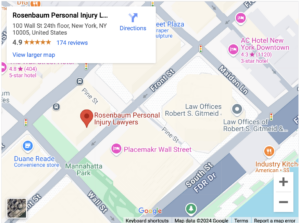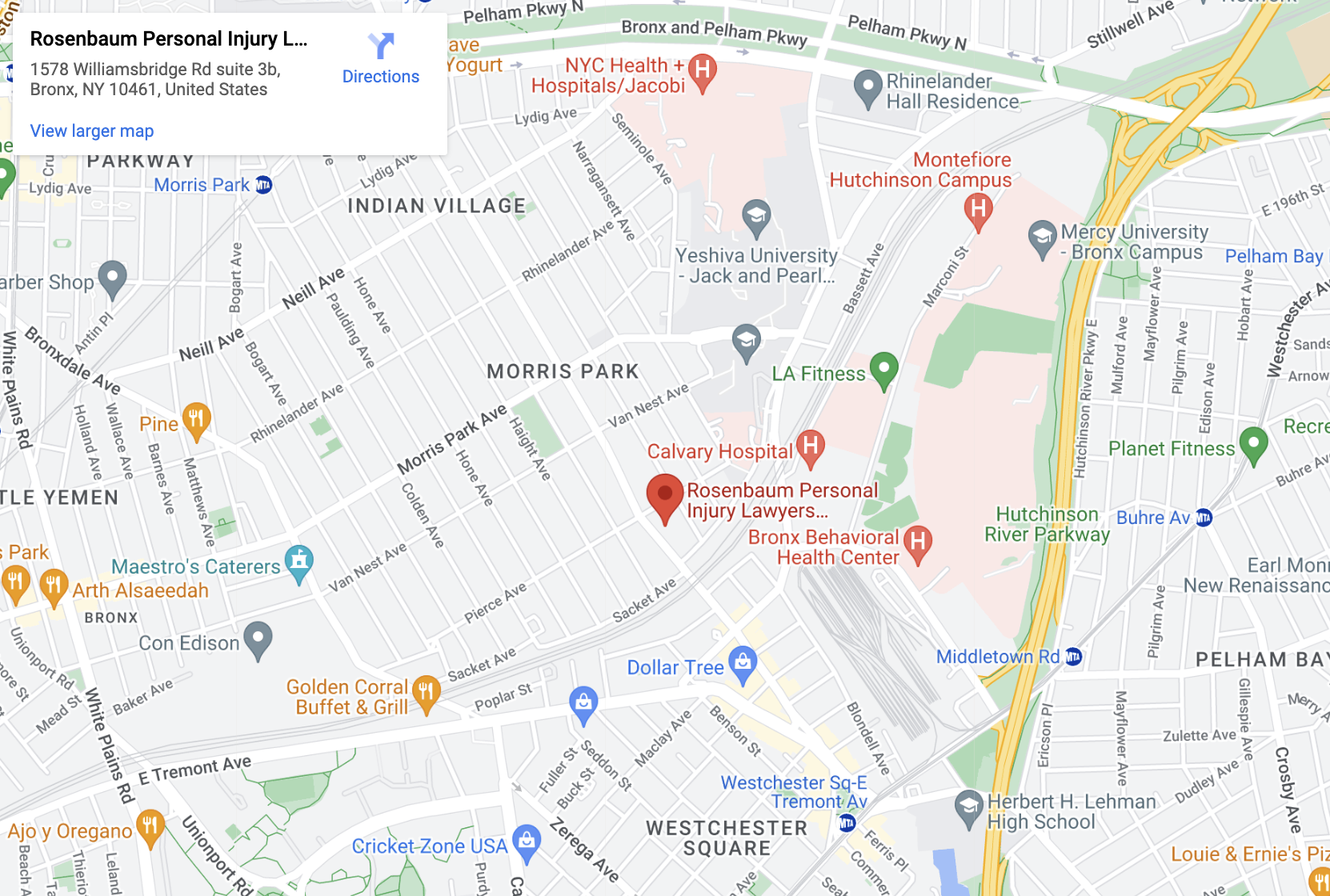How New York Statutes Impact Personal Injury Claims

Car accidents and other accidents causing injury are stressful and unfamiliar events. If you’ve never been hurt suddenly and unexpectedly, it is natural that you would be unfamiliar with how insurance claims and injury lawsuits typically work.
New York has its own set of laws that dictate who can sue, when you can sue, and what you can sue for.
The primary New York laws which may impact your personal injury claim relating to:
- Time limits for filing lawsuits (statute of limitations)
- Filing claims against public or government agencies
- Shared fault and pure comparative negligence in car accidents
- Whether injuries meet the “serious injury” threshold to file a personal injury claim.
At Rosenbaum Personal Injury Lawyers, our law firm is well-versed in how New York statutes impact personal injury claims and affect New Yorkers. We can review the facts of your accident, explain relevant New York law, and determine if you have a case for medical expenses, lost earnings, and pain and suffering. Contact our personal injury law firm in Manhattan to schedule a free consultation to learn more today.
Table of Contents
How Our Personal Injury Lawyers Can Help After An Accident
Following a serious injury accident, victims and their families have many questions. Some of the most frequently asked questions in a case evaluation include:
- How much is my personal injury case worth?
- How long do I have to file a personal injury case?
- How long will it take to get a personal injury settlement?
- How do I pay medical bills until I get my settlement?
- What if I’m partly at fault for my car accident?
- Will my personal injury case go to trial?
If you have questions about which statutes will apply in a personal injury claim, or any other question related to your car accident – call our New York City personal injury lawyers. We have more than 40 years of experience handling personal injury claims like yours.
We understand New York’s statutes and unique laws like the New York State Serious Injury Threshold law and the Estate Powers and Trust Law (EPTL), New York’s wrongful death statute. We can help you navigate the complexities of the law and fight to get the money you deserve.
What is a Statute?

A statute is a law enacted by a legislature. In personal injury and civil litigation, the most commonly referenced statutes are the statute of limitations, which require a claim to be brought within a specific time period.
The New York Codes, Rules, and Regulations (NYCRR), published by the New York Department of State, contains New York’s rules and regulations. There are 23 titles of these laws, including
- Agriculture
- Education
- Labor
- Motor Vehicles
- Public Service
- Transportation
- Taxation and Finance
- Judiciary
Along with restricting how much time you have to file a personal injury lawsuit, statutes can also set requirements regarding where you must file a lawsuit and how the defendant must be served.
Another statute, Article 16, a section of the New York Consolidated Laws Civil Practice Laws & Rules (CPLR), sets forth the law regarding how liability works for non-economic damages when multiple people are liable for damages in a personal injury case.
Claims Against the State of New York or a Municipality
New York has waived its right to sovereign immunity, an esoteric rule that goes back to “the divine right of kings.” Under this doctrine, New York and its municipalities were immune from lawsuits from people who were injured by dangerous conditions on their property or by acts of state employees and agents.
However, as an injured plaintiff, in order to take advantage of this waiver sovereign immunity, you absolutely must file a “notice of claim” within 90 days of your accident. The court may extend this deadline, but it’s procedurally much simpler if you are able to file within the 90 day period.
Examples of accidents that could result in city or state liability include:
- You slip and fall while visiting a state park
- Your child is injured at public school
- You are in an accident with a city-owned car driven by a city employee
- You are injured on a bus or subway
- A doctor at a public hospital is grossly negligent, causing your injury.
- Your loved one is a victim of severe nursing home abuse at a city nursing home.
The notice of claim also applies to accidents involving a New York State public-benefit corporation such as:
- The Battery Park City Authority
- The Long Island Power Authority
- The New York State Thruway
- The Lower Manhattan Development Corporation
- The Metropolitan Transportation Authority
- The New York City Economic Development Corporation.
The Court of Claims Act applies to any lawsuit involving a public agency. Because these lawsuits are complex, heavily defended, and subject to very strict filing requirements, it’s recommended to seek a qualified lawyer immediately if a public agency, municipality, or government entity is suspected to be involved.
Allocating Fault and Liability in a New York Personal Injury Claim
New York is one of 13 states that has adopted a “pure comparative fault” system. This involves assigning responsibility to parties based on the degree in which they were negligent. N.Y. C.P.L.R. § 1411 states that every party involved in an accident has the right to recover compensation, as long as they aren’t solely to blame.
In a personal injury case, the amount of damages awarded is reduced based on the degree of fault. Plaintiffs can recover compensation even if they’re partially at fault, but insurance companies will use this argument to justify a lower compensation offer.
This is one area where simply having a lawyer is enough to prevent an insulting, lowball insurance offer based on a high percentage of fault. Examples of these defense arguments include:
- A driver or passenger was not wearing a seat belt
- A bicyclist was not wearing a helmet
- A pedestrian was crossing the street outside of a crosswalk
- A driver was in a semi-truck’s blind spot when a collision occurred.
Whether or not a case goes to trial, the defense will argue that the plaintiff contributed to their own injuries. A competent New York City personal injury lawyer can present the correct version of facts and fight for a lower percentage of fault.
Damages Caps in New York Medical Malpractice Claims
Medical errors are the third leading cause of death in the United States, resulting in 250,000 years annually. Medical malpractice could be lapses in judgment, mistaken diagnoses, and preventable complications of care. The four D’s of medical negligence are:
- Healthcare provider’s Duty of care
- Deviation from the standard of care
- Damages resulted from the deviation of the standard of care.
- The deviation was the Direct cause of damages.
Thirty states have caps, or maximum dollar limits, on damages available for pain and suffering. New York has no damage “caps,” meaning the number of damages that can be obtained in a verdict is at the jury’s discretion and is not restricted by law. If you suspect medical malpractice, contact Rosenbaum Personal Injury Lawyers to discuss your potential case.
Wrongful Death Lawsuits
A wrongful death claim is a lawsuit filed when someone’s negligent or intentional actions caused someone’s death. A wrongful death claim could arise from a fatal car accident, fatal construction accident, or a dangerous product. A claim may be filed against a person, a private organization, a public company, or a government agency. In New York, a wrongful death claim may be filed by:
- The decedent’s spouse;
- The decedent’s children;
- The decedent’s parents; and
- The personal representative for the estate of the decedent.
Compensation is distributed to those eligible under intestate law, in proportion to their loss. A wrongful death lawsuit must be filed within two years of the date of the person’s death.
If you are mourning the loss of a loved one and would like to know your rights in a wrongful death claim, the caring and respectful wrongful death New York attorneys at Rosenbaum Personal Injury Lawyers are just a phone call away. Our lawyers understand the statutes and laws that will apply to your claim.
Rosenbaum Personal Injury Lawyers, Can Help You Understand How New York Statutes Impact Personal Injury CLaims
Although many of the statues related to personal injury claims relate to how long you have to file a claim, it is important to note that it is never too early to contact a lawyer. You should contact a lawyer as soon as possible after your immediate medical needs have been addressed.
A skilled and experienced New York personal injury attorney will immediately level the playing field by equipping you with resources and knowledge. Insurance adjusters will take advantage of a trusting and traumatized policyholder, who is vulnerable and desperate. Before you accept any offer from an insurance company, talk to a lawyer.
At Rosenbaum Personal Injury Lawyers, our accident attorneys offer a free case evaluation to answer your questions, review your accident, and discuss your legal rights and options. Because we handle all of our cases on a contingency fee basis, you will pay no attorney fees until we recover money for you.
If you or a family member has been involved in an accident, contact us as soon as possible. We are available seven days a week to take your call.



